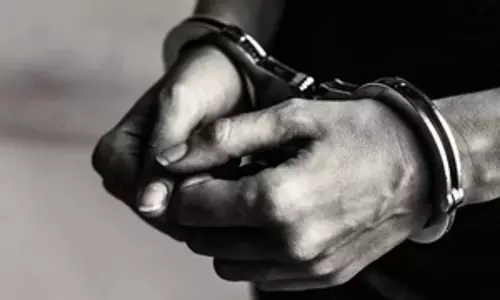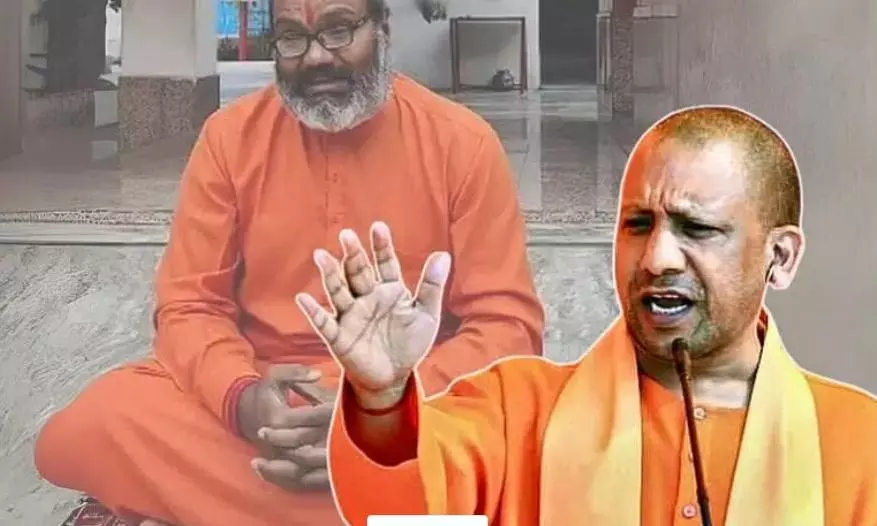
Narsinghanand's Prophet remark: Yogi calls it unacceptable; BJP leaders demand action
text_fieldsThe controversial remark made by Hindutva leader Yati Narsinghanand Giri against Prophet Muhammad triggered widespread protests across the country, leading to multiple FIRs being filed against him.
Uttar Pradesh Chief Minister Yogi Adityanath took care to maintain a balanced response, stating that derogatory remarks against any religious figures are unacceptable and that anarchy in the name of protests will not be tolerated, following the arrests of six individuals for allegedly pelting stones during a protest against Narsinghanand Giri in Ghaziabad.
Narsinghanand’s comments, which were shared widely on social media, triggered widespread protests across several states, including Uttar Pradesh, Maharashtra, and Jammu and Kashmir, leading to multiple FIRs being filed against him.
Yogi Adityanath addressed the issue, asserting that derogatory remarks against religious figures or sects would not be tolerated under any circumstances. At the same time, the Chief Minister stressed that protests that devolve into acts of vandalism or violence would also face legal consequences.
His statement was seen as a balanced approach, condemning both the inflammatory rhetoric of individuals like Narsinghanand and the responses from some of the protestors.
Narsinghanand’s speech, delivered on September 29, sparked an outcry from Muslim groups, who viewed the remarks as a direct insult to their religious beliefs. Protests soon followed, with demonstrations erupting in cities across UP and other regions, including Maharashtra, Telangana, and Jammu and Kashmir.
During the protests near a local temple in Ghaziabad, a mob of nearly 150 people clashed with police officers, who reportedly faced stones being thrown at them, resulting in the arrest of six men who were identified as participants in the mob. The arrested individuals were identified as residents of Ghaziabad, and they face charges related to defiling a place of worship, public mischief, rioting, and assaulting public servants.
Adityanath held a high-level meeting with senior officials to discuss the state's law and order situation, particularly in light of the upcoming Sharadiya Navratri and Vijayadashami festivals. The Chief Minister emphasised the importance of maintaining peace and harmony during these celebrations and directed police forces to increase patrolling in crowded areas to ensure public safety.
He also issued orders for a stricter crackdown on those attempting to disrupt communal harmony, highlighting the need to deal firmly with anyone acting outside the law.
Narsinghanan had previously faced charges for making controversial statements, including a call for the demolition of madrasas and Aligarh Muslim University two years ago. In early 2022, Narsinghanand was arrested for calling for the genocide of Muslims during a religious conclave in Haridwar. Although he was granted bail in that case, his release was conditional on him refraining from participating in gatherings that could incite communal divisions.
As tensions over Narsinghanand’s latest comments continue to simmer, calls for legal action against him have intensified. In Jammu and Kashmir, political leaders from the BJP condemned the remarks, urging the authorities to take swift and decisive action to preserve communal harmony.
Ravinder Raina, BJP’s chief in the Union territory, emphasised the need to maintain communal harmony and respect all religious sentiments, stating that inflammatory rhetoric undermines the values of peace and unity that India stands for. He urged authorities to take swift legal action to ensure justice and preserve the social fabric of the country.
Muslim leaders in Jammu and Kashmir also voiced their concerns, sending a formal letter to Union Home Minister Amit Shah, demanding that Narsinghanand be held accountable for his comments. They emphasised that while freedom of speech is a fundamental right in any democratic society, it should not be misused to spread hatred or cause harm to the sentiments of an entire community.
The protests in response to Narsinghanand’s speech have raised broader questions about the limits of free speech and the responsibility of public figures to avoid inciting violence or creating divisions. As the legal proceedings against Narsinghanand unfold, it remains to be seen how the authorities will navigate the complex balance between protecting freedom of expression and maintaining public order.























